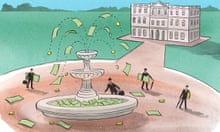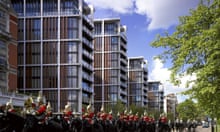Labour’s plans to press ahead with a mansion tax on multimillion-pound properties would create an “Upstairs, Downstairs” divide that would discriminate against cash-poor homeowners who have built equity through successive house price rises, estate agents have said.
The Labour leader, Ed Miliband, is due to give further details of the proposals in a speech to the party conference on Tuesday afternoon, a day after the shadow chancellor, Ed Balls, confirmed that a Labour government would introduce the plan, originally floated by the Liberal Democrats, to levy a tax on houses worth more than £2m.
Estate agents launched a fresh attack on the tax, which they have previously criticised as unfair and difficult to administer. Nick Leeming, chairman of Jackson-Stops and Staff, which has 44 offices nationwide, said the mansion tax would hit the Carsons of this world rather than the Lord Granthams – referring to the butler and the lord of Downton Abbey in the ITV period drama.
“The Downton Abbey view of politics is distorting the realities of those who own homes in the £2m-plus bracket. This will affect people all over the country, not just in London where the market has been most buoyant,” he said. “Many owners are people who have worked hard throughout their lives and have been in their homes for many years, or those who have invested in their home to provide a secure retirement. Many are asset-rich and income poor and the threat of a mansion tax would force these people to sell up.”
A council tax would be a fairer way to raise income, Leeming added, with a revaluation of the system and additional bands introduced.
On Monday, Balls reiterated Labour’s pledge to introduce a mansion tax. “We will levy a tax on the highest-value properties over £2m – a mansion tax. We’ll do it in a fair, sensible and proportionate way, raising the limit each year in line with average house prices and putting in place protections for those who are asset-rich and cash poor,” he said.
“We’ll make sure that properties worth tens of millions of pounds make significantly bigger contributions than those houses that are just above the £2m limit. Because how can it be right that a billionaire overseas buyer this year of a £140m penthouse in Westminster will pay just £26 a week in property tax – the same as the average property tax in that area. We will make different choices.”
If Labour wins the general election next year there will four levels of mansion tax, which will be used to raise an estimated £1.7bn a year for the NHS. The lowest bands would be for homes valued at £2m-£5m. The “asset rich, cash poor” could be helped by allowing them to defer payment of the tax until they sell their property.
Lucian Cook, director of residential research at estate agency Savills and author of Taxing Mansions, published by the Centre for Policy Studies this year, said: “The common perception is that owners of high-value homes pay a disproportionately low level of taxes. Our analysis suggests quite the contrary, especially given the recent changes to the stamp duty land tax regime.
“A mansion tax, with a fixed threshold, would distort market dynamics and really create a threshold at the £2m mark. And at a human level, it would hurt those cash-poor long-term owners whose homes fall into the so-called mansion bracket only by dint of house price increases.”
Critics have said the policy could hit pensioners hardest because, according to studies – including by the CPS – almost a third of properties worth more than £2m have been in the same ownership for more than 10 years.
The phrase mansion tax has been described as a misnomer as 10% of properties in London valued at £2m-plus are one- or two-bedroom flats.








Comments (…)
Sign in or create your Guardian account to join the discussion